人教版(2019) 选择性必修第一册 Unit 2 Looking into the Future Listening and Speaking课件(35张)
文档属性
| 名称 | 人教版(2019) 选择性必修第一册 Unit 2 Looking into the Future Listening and Speaking课件(35张) | 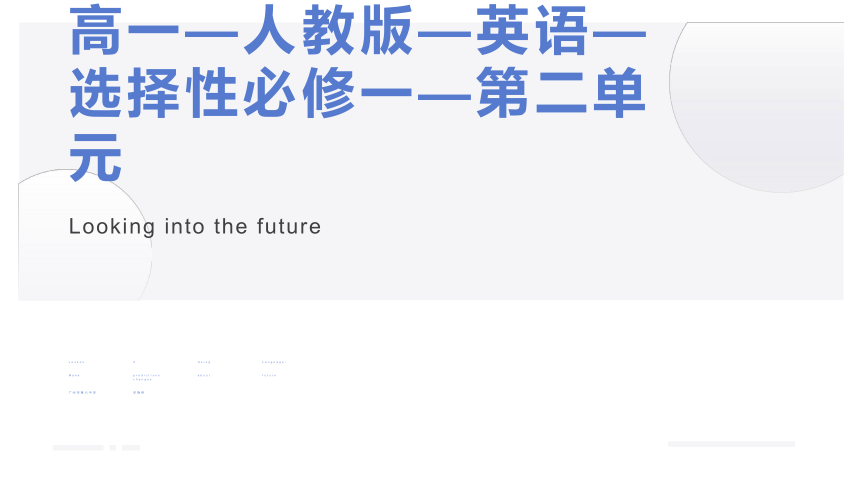 | |
| 格式 | zip | ||
| 文件大小 | 5.6MB | ||
| 资源类型 | 教案 | ||
| 版本资源 | 人教版(2019) | ||
| 科目 | 英语 | ||
| 更新时间 | 2022-06-03 16:53:26 | ||
图片预览

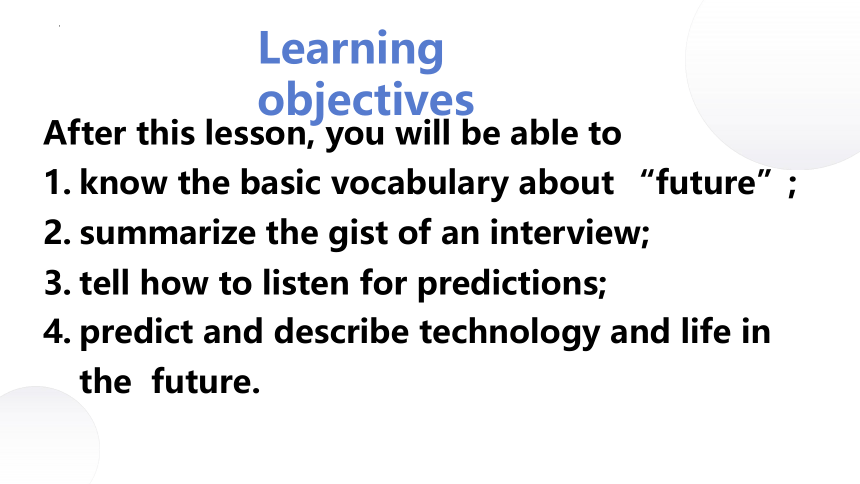
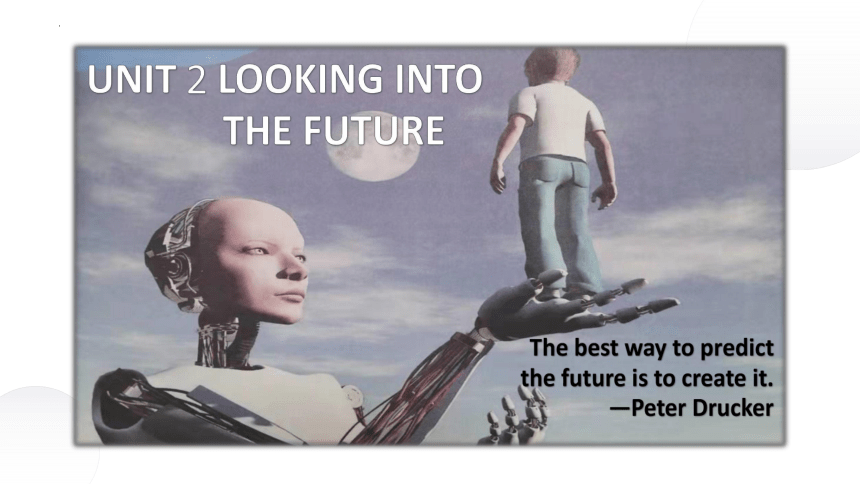
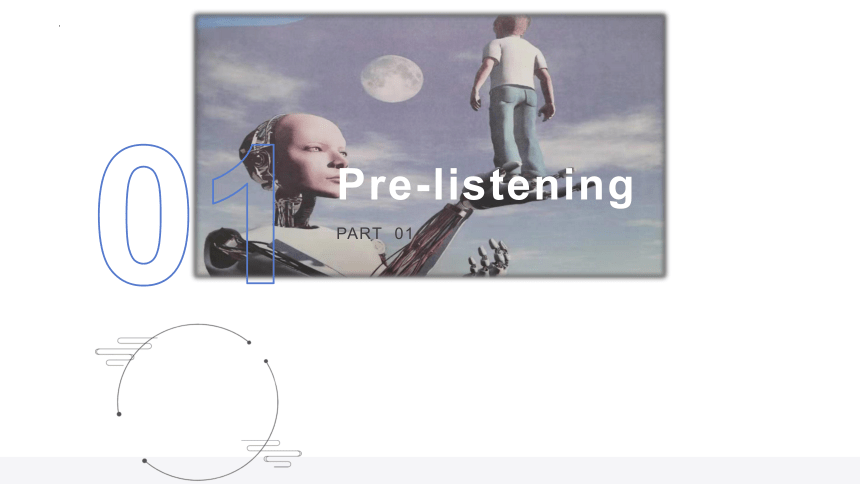
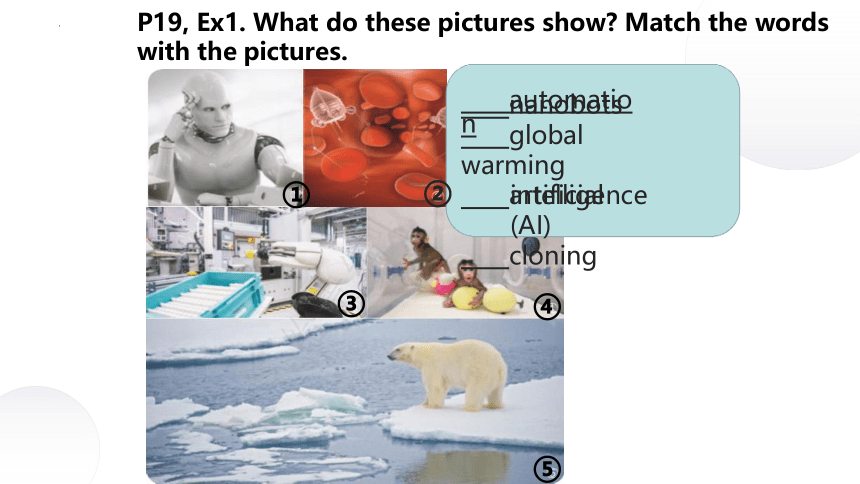
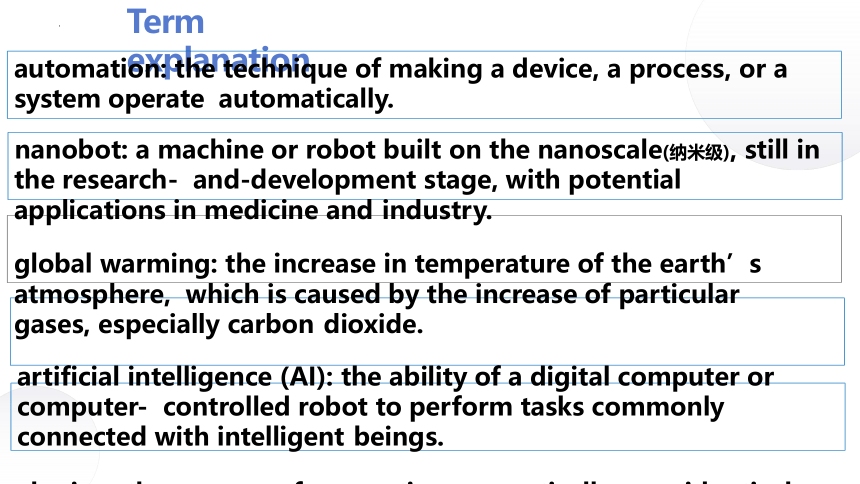
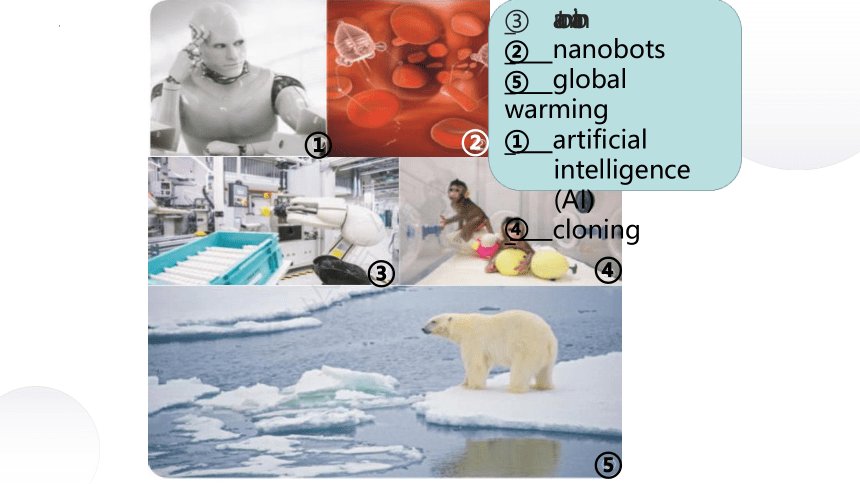
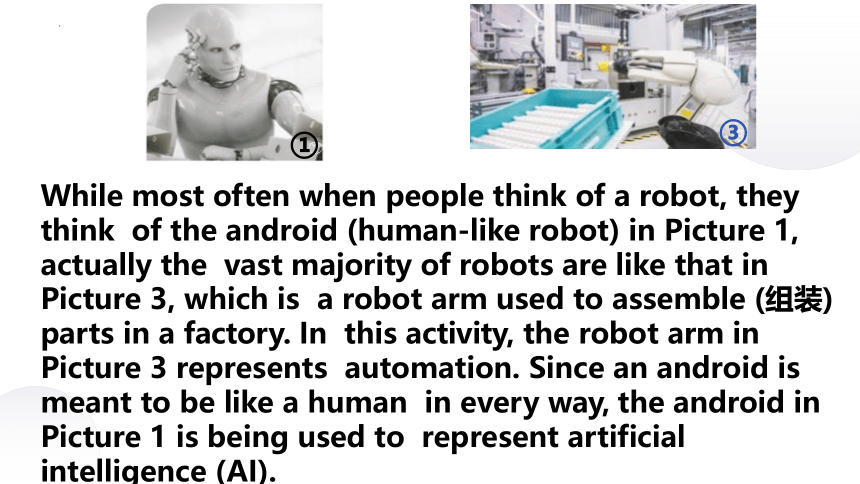
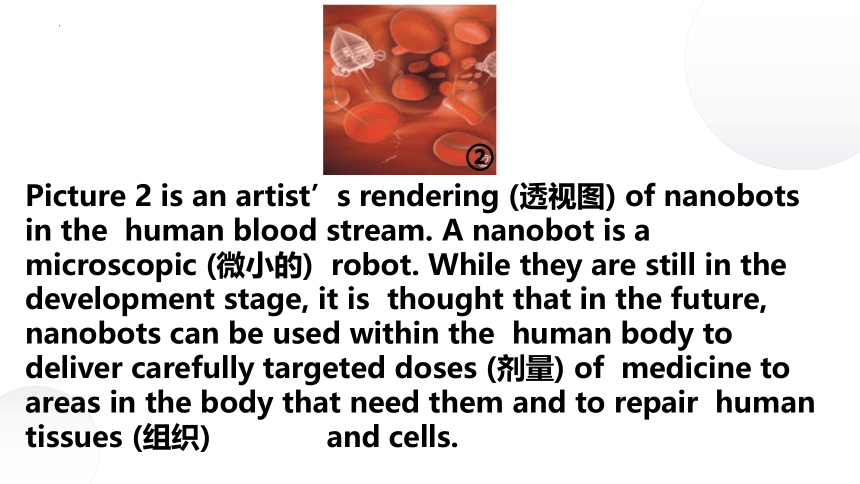
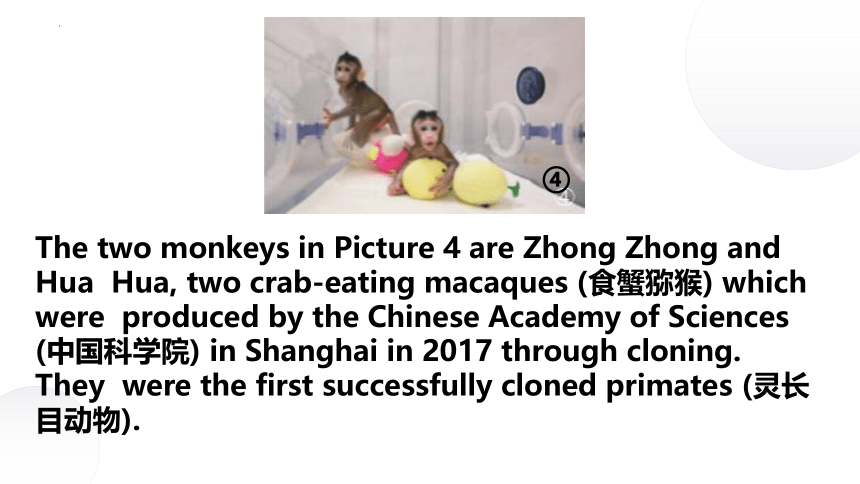
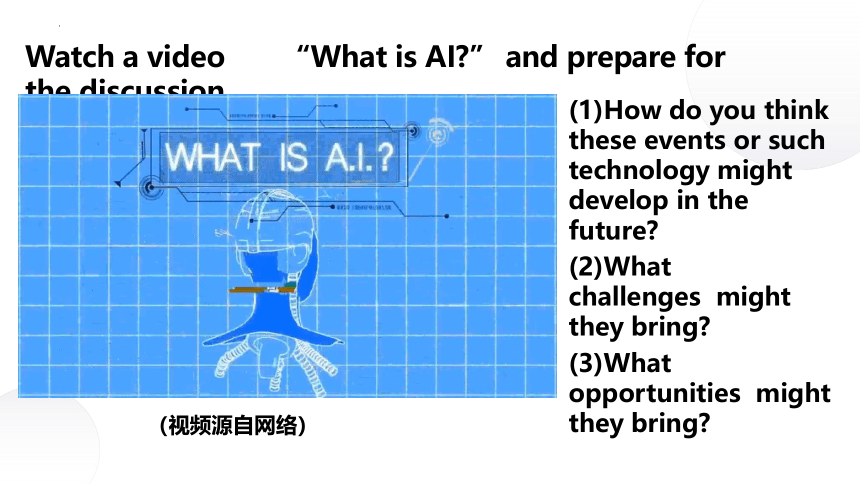
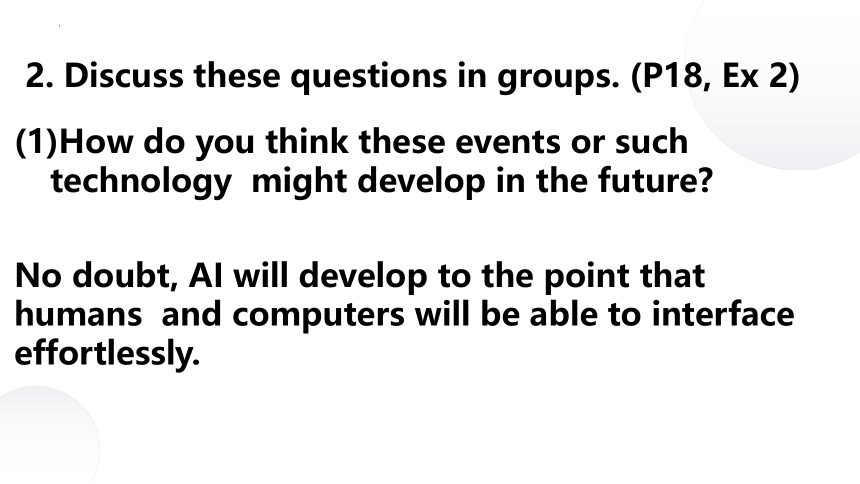
文档简介
(共35张PPT)
高一—人教版—英语—选择性必修一—第二单元
Looking into the future
Lesson 4 Using Language:
Make predictions about future changes
广州市第六中学 邓静燕
After this lesson, you will be able to
know the basic vocabulary about “future”;
summarize the gist of an interview;
tell how to listen for predictions;
predict and describe technology and life in the future.
Learning objectives
01
Pre-listening
PART 01
automation
nanobots
global warming
artificial
intelligence (AI)
cloning
⑤
④
③
①
②
P19, Ex1. What do these pictures show Match the words with the pictures.
Term explanation
automation: the technique of making a device, a process, or a system operate automatically.
nanobot: a machine or robot built on the nanoscale(纳米级), still in the research- and-development stage, with potential applications in medicine and industry.
global warming: the increase in temperature of the earth’s atmosphere, which is caused by the increase of particular gases, especially carbon dioxide.
artificial intelligence (AI): the ability of a digital computer or computer- controlled robot to perform tasks commonly connected with intelligent beings.
cloning: the process of generating a genetically(基因地) identical(相同的) copy of a cell(细胞) or an organism(有机体).
⑤
④
③
①
②
_③ automation
_② nanobots
_⑤ global warming
_① artificial
intelligence (AI)
_④ cloning
While most often when people think of a robot, they think of the android (human-like robot) in Picture 1, actually the vast majority of robots are like that in Picture 3, which is a robot arm used to assemble (组装) parts in a factory. In this activity, the robot arm in Picture 3 represents automation. Since an android is meant to be like a human in every way, the android in Picture 1 is being used to represent artificial intelligence (AI).
③
①
②
Picture 2 is an artist’s rendering (透视图) of nanobots in the human blood stream. A nanobot is a microscopic (微小的) robot. While they are still in the development stage, it is thought that in the future, nanobots can be used within the human body to deliver carefully targeted doses (剂量) of medicine to areas in the body that need them and to repair human tissues (组织) and cells.
④
The two monkeys in Picture 4 are Zhong Zhong and Hua Hua, two crab-eating macaques (食蟹猕猴) which were produced by the Chinese Academy of Sciences (中国科学院) in Shanghai in 2017 through cloning. They were the first successfully cloned primates (灵长目动物).
Watch a video “What is AI ” and prepare for the discussion.
(视频源自网络)
How do you think these events or such technology might develop in the future
What challenges might they bring
What opportunities might they bring
2. Discuss these questions in groups. (P18, Ex 2)
(1)How do you think these events or such technology might develop in the future
No doubt, AI will develop to the point that humans and computers will be able to interface effortlessly.
2. Discuss these questions in groups.
(2) What challenges might they bring
With the development of AI, there may come a time when it becomes a real issue as to whether a computer or machine has in fact achieved consciousness, and whether, as a conscious being, it deserves the same rights as a human being.
2. Discuss these questions in groups.
(3) What opportunities might they bring
Al may help us solve problems that are currently too big and overwhelming for us to solve on our own.
For example, complex AI models may be able to use given data to develop a workable solution to global warming.
If you make a prediction about something, you say what you think will happen.
(Collins Dictionary)
The Simple
Future tense
一般将来时
Listening strategy — Listen for predictions Future
continuous tense
将来进行时
v.预测
n.预测
v.&n.预测
PART 02
While-listening
Listening for gist
(P19, Ex 3) Listen to the radio interview with Dr Han and Vincent Black giving their predictions about the future, and then fill in the table below.
Name Occupation Prediction
Dr Han computer scientist Computers will be cleverer than us;
people will be programming computers to think like humans; we’ll be programming them to not think in ways that may harm humans;
we’ll also be creating machines to help people internally.
Vincent Black architect There will be cities floating on water and people could move into housing in cities that float.
Listening for details
Listen to the tape for the second time and fill in the blanks.
Host: On today's episode of "Future Changes", we talk with two experts from different fields, Dr Han and Vincent Black, to hear their predictions about the future. First, Dr Han, could you please tell our audience what you do
Dr Han: Certainly. I'm a computer scientist.
Host: And could you please tell us your prediction
Dr Han: Yes, well, I forecast that computers will be cleverer than us in the future.
I_t_h in k t_h a_t people will also be programming computers to think like humans. Host: That's very interesting, but aren't you worried that such computers would be dangerous
Dr Han: Not at all. This is because w e_'_ll b_e pr_o g_r_a m min g_ them to not think in
ways that may harm humans . In fact, we'll also be creating machines to help people internally. For example, I think scientists will put some small
intelligent machines , called nanobots, inside our bodies to increase our
abilities.
Host: Wow! That would make each one of us superhuman! And Vincent, could you please tell us about your job
Vincent Black: Certainly. I'm an architect. I design buildings .
Host: And what is your p_r_e_d i_c_t_i_o_n ab_o u_t the buildings of the future Vincent Black: It's about the cities of the future, actually. I believe that
cities f_l_o_a ti_n g o_n w a_t_e_r_ are part of the world's future. Host: Oh, really What might make us want to do that
Vincent Black: Yes. With global warming causing p_o l_a_r ic_e t_o m e_l_t , the sea level rising by many metres is a very realistic prospect . Instead of moving people away from the sea, I t_h_i_n k t_h_a t people could move into housing in cities that float.
Host: That sounds very innovative . Could you please give us more details Vincent Black: Sure. Well, I've developed a plan by _d_e s_i_g_n in g a c_i_t_y that borrows many ideas from the giant water lily, a flower
that_f_l_o_a t_s_o n w a_t_e r_. Moreover ...
Discussion
P19, Ex 4. Work in pairs. Discuss whether you think Dr Han and Vincent Black’s predictions are possible. Why or why not
Tips:
Sentence patterns used to express predictions:
I forecast that …/ I think that …/ I believe that … Tenses used to express predictions:
will be doing …/ will do …
Possible answers:
l agree on Dr Han's idea that computers will be cleverer than us in the future. Actually there are already computers, like AlphaGo, that are smarter than most people.
l don't agree on Vincent Black's idea about floating cities, because I doubt that sea levels will rise that much.
01
Post-listening
PART 03
(P19, Ex 5) In groups, brainstorm about the future. Discuss these points.
future events or problems the world might face
future technologies
how these things will change the way we live
the challenges and opportunities these things might bring
(P19, Ex 6) Imagine that you have a job that makes you an expert in the future. In pairs, interview each other about your jobs and predictions.
Sample Dialogue
A: Good afternoon, Ms Zhang. Thank you for agreeing to do this interview.
B: I'd love to.
A: First, could you please tell our audience what you do
B: Certainly. I'm a doctor. I perform transplant surgery every week.
A:That sounds like a very high-tech job. How do you think the surgery will be operated in the future Do you have any predictions about that
B: Yes, well, I believe that doctors in the future will have much better means to help people. I can imagine that nanobots will be put in patients’ body to detect the illness. And in the future, there will be adequate supply of organs for patients who need transplant.
A: Well, that would be really good news for all of us. Could you please explain how this will be possible
B: It will be possible because of special 3D printers. In the future, doctors will be using them in hospitals regularly to create healthy copies of people's organs. Then they will replace the unhealthy organs with the healthy copies.
Thank your for inviting me. / It’s my pleasure.
Summary
In this lesson, we have learned:
the basic vocabulary about “future”;
to summarize the gist of an interview;
how to listen for predictions;
to predict and describe technology and life in the future.
Finish the “Listening and Speaking” exercises in the workbook (Ex 1-5, P70).
高一—人教版—英语—选择性必修一—第二单元
Looking into the future
Lesson 4 Using Language:
Make predictions about future changes
答疑课
广州市第六中学 邓静燕
(P70, Ex 1) Look at the photos and the captions. Discuss what you think is happening.
Picture A. Garry Kasparov feels disappointed after he lost his chess match to a computer.
Picture B. An android is playing the winning move in a game of chess. Picture C. Ke Jie is thinking hard as his computer opponent is winning.
(P70, Ex 2)
Listen to this conversation from the future between Yueyue and Huimin, an android that uses AI (artificial intelligence). Order the pictures above (A-C) according to when the events occurred by writing 1-3 in the blanks.
A 1 B
C 2
3
(P70, Ex 3)
Listen to the conversation again and write down the dates when the following events occur. They are having this conversation in the year 2310.
Al research begins
Garry Kasparov defeated by Deep Blue
Ke Jie defeated by AlphaGo
Al computers put into androids
First novel written by an android
_i_n 1_95_6
in 19_9_7
in 2_01_7
in t_he_mi_d_-_2_1s_t c_e_nt_u_r_y_
in t_he mid-22_n_d c_en_t_u_r_y_
6. First android president of a country_i_n the mid-23_r_d
ce_n_t_u_r_y_
(P70, Ex 4)
Listen to the conversation again and answer the questions.
What are Yueyue and Huimin doing while they are talking
They are playing chess.
What does Yueyue want Huimin to do differently
To make the game easier.
What does Huimin offer to do for Yueyue while she is thinking
To offer some tea for her.
What happens in the end
Huimin wins the game.
What does Yueyue ask Huimin to do when they are finished
Let her win the next game.
(P70, Ex 5)
What do you think AI will be able to do in the future How will it affect humans Discuss your predictions about AI and other future technologies. AI is able to understand and manipulate data so much faster that it can help us to spot patterns more quickly. Thus, in the future, AI will help us to solve problems that we consider too complex to solve now. It is already helping us in a wide variety of fields such as medicine and human-to-machine communication. The effect of this is that we can more easily communicate with our devices such as smartphones, and better organise our time. I think in the future many devices will work automatically, like cars will be self-driving and safe, which gives us more time to focus on other important things in life.
高一—人教版—英语—选择性必修一—第二单元
Looking into the future
Lesson 4 Using Language:
Make predictions about future changes
广州市第六中学 邓静燕
After this lesson, you will be able to
know the basic vocabulary about “future”;
summarize the gist of an interview;
tell how to listen for predictions;
predict and describe technology and life in the future.
Learning objectives
01
Pre-listening
PART 01
automation
nanobots
global warming
artificial
intelligence (AI)
cloning
⑤
④
③
①
②
P19, Ex1. What do these pictures show Match the words with the pictures.
Term explanation
automation: the technique of making a device, a process, or a system operate automatically.
nanobot: a machine or robot built on the nanoscale(纳米级), still in the research- and-development stage, with potential applications in medicine and industry.
global warming: the increase in temperature of the earth’s atmosphere, which is caused by the increase of particular gases, especially carbon dioxide.
artificial intelligence (AI): the ability of a digital computer or computer- controlled robot to perform tasks commonly connected with intelligent beings.
cloning: the process of generating a genetically(基因地) identical(相同的) copy of a cell(细胞) or an organism(有机体).
⑤
④
③
①
②
_③ automation
_② nanobots
_⑤ global warming
_① artificial
intelligence (AI)
_④ cloning
While most often when people think of a robot, they think of the android (human-like robot) in Picture 1, actually the vast majority of robots are like that in Picture 3, which is a robot arm used to assemble (组装) parts in a factory. In this activity, the robot arm in Picture 3 represents automation. Since an android is meant to be like a human in every way, the android in Picture 1 is being used to represent artificial intelligence (AI).
③
①
②
Picture 2 is an artist’s rendering (透视图) of nanobots in the human blood stream. A nanobot is a microscopic (微小的) robot. While they are still in the development stage, it is thought that in the future, nanobots can be used within the human body to deliver carefully targeted doses (剂量) of medicine to areas in the body that need them and to repair human tissues (组织) and cells.
④
The two monkeys in Picture 4 are Zhong Zhong and Hua Hua, two crab-eating macaques (食蟹猕猴) which were produced by the Chinese Academy of Sciences (中国科学院) in Shanghai in 2017 through cloning. They were the first successfully cloned primates (灵长目动物).
Watch a video “What is AI ” and prepare for the discussion.
(视频源自网络)
How do you think these events or such technology might develop in the future
What challenges might they bring
What opportunities might they bring
2. Discuss these questions in groups. (P18, Ex 2)
(1)How do you think these events or such technology might develop in the future
No doubt, AI will develop to the point that humans and computers will be able to interface effortlessly.
2. Discuss these questions in groups.
(2) What challenges might they bring
With the development of AI, there may come a time when it becomes a real issue as to whether a computer or machine has in fact achieved consciousness, and whether, as a conscious being, it deserves the same rights as a human being.
2. Discuss these questions in groups.
(3) What opportunities might they bring
Al may help us solve problems that are currently too big and overwhelming for us to solve on our own.
For example, complex AI models may be able to use given data to develop a workable solution to global warming.
If you make a prediction about something, you say what you think will happen.
(Collins Dictionary)
The Simple
Future tense
一般将来时
Listening strategy — Listen for predictions Future
continuous tense
将来进行时
v.预测
n.预测
v.&n.预测
PART 02
While-listening
Listening for gist
(P19, Ex 3) Listen to the radio interview with Dr Han and Vincent Black giving their predictions about the future, and then fill in the table below.
Name Occupation Prediction
Dr Han computer scientist Computers will be cleverer than us;
people will be programming computers to think like humans; we’ll be programming them to not think in ways that may harm humans;
we’ll also be creating machines to help people internally.
Vincent Black architect There will be cities floating on water and people could move into housing in cities that float.
Listening for details
Listen to the tape for the second time and fill in the blanks.
Host: On today's episode of "Future Changes", we talk with two experts from different fields, Dr Han and Vincent Black, to hear their predictions about the future. First, Dr Han, could you please tell our audience what you do
Dr Han: Certainly. I'm a computer scientist.
Host: And could you please tell us your prediction
Dr Han: Yes, well, I forecast that computers will be cleverer than us in the future.
I_t_h in k t_h a_t people will also be programming computers to think like humans. Host: That's very interesting, but aren't you worried that such computers would be dangerous
Dr Han: Not at all. This is because w e_'_ll b_e pr_o g_r_a m min g_ them to not think in
ways that may harm humans . In fact, we'll also be creating machines to help people internally. For example, I think scientists will put some small
intelligent machines , called nanobots, inside our bodies to increase our
abilities.
Host: Wow! That would make each one of us superhuman! And Vincent, could you please tell us about your job
Vincent Black: Certainly. I'm an architect. I design buildings .
Host: And what is your p_r_e_d i_c_t_i_o_n ab_o u_t the buildings of the future Vincent Black: It's about the cities of the future, actually. I believe that
cities f_l_o_a ti_n g o_n w a_t_e_r_ are part of the world's future. Host: Oh, really What might make us want to do that
Vincent Black: Yes. With global warming causing p_o l_a_r ic_e t_o m e_l_t , the sea level rising by many metres is a very realistic prospect . Instead of moving people away from the sea, I t_h_i_n k t_h_a t people could move into housing in cities that float.
Host: That sounds very innovative . Could you please give us more details Vincent Black: Sure. Well, I've developed a plan by _d_e s_i_g_n in g a c_i_t_y that borrows many ideas from the giant water lily, a flower
that_f_l_o_a t_s_o n w a_t_e r_. Moreover ...
Discussion
P19, Ex 4. Work in pairs. Discuss whether you think Dr Han and Vincent Black’s predictions are possible. Why or why not
Tips:
Sentence patterns used to express predictions:
I forecast that …/ I think that …/ I believe that … Tenses used to express predictions:
will be doing …/ will do …
Possible answers:
l agree on Dr Han's idea that computers will be cleverer than us in the future. Actually there are already computers, like AlphaGo, that are smarter than most people.
l don't agree on Vincent Black's idea about floating cities, because I doubt that sea levels will rise that much.
01
Post-listening
PART 03
(P19, Ex 5) In groups, brainstorm about the future. Discuss these points.
future events or problems the world might face
future technologies
how these things will change the way we live
the challenges and opportunities these things might bring
(P19, Ex 6) Imagine that you have a job that makes you an expert in the future. In pairs, interview each other about your jobs and predictions.
Sample Dialogue
A: Good afternoon, Ms Zhang. Thank you for agreeing to do this interview.
B: I'd love to.
A: First, could you please tell our audience what you do
B: Certainly. I'm a doctor. I perform transplant surgery every week.
A:That sounds like a very high-tech job. How do you think the surgery will be operated in the future Do you have any predictions about that
B: Yes, well, I believe that doctors in the future will have much better means to help people. I can imagine that nanobots will be put in patients’ body to detect the illness. And in the future, there will be adequate supply of organs for patients who need transplant.
A: Well, that would be really good news for all of us. Could you please explain how this will be possible
B: It will be possible because of special 3D printers. In the future, doctors will be using them in hospitals regularly to create healthy copies of people's organs. Then they will replace the unhealthy organs with the healthy copies.
Thank your for inviting me. / It’s my pleasure.
Summary
In this lesson, we have learned:
the basic vocabulary about “future”;
to summarize the gist of an interview;
how to listen for predictions;
to predict and describe technology and life in the future.
Finish the “Listening and Speaking” exercises in the workbook (Ex 1-5, P70).
高一—人教版—英语—选择性必修一—第二单元
Looking into the future
Lesson 4 Using Language:
Make predictions about future changes
答疑课
广州市第六中学 邓静燕
(P70, Ex 1) Look at the photos and the captions. Discuss what you think is happening.
Picture A. Garry Kasparov feels disappointed after he lost his chess match to a computer.
Picture B. An android is playing the winning move in a game of chess. Picture C. Ke Jie is thinking hard as his computer opponent is winning.
(P70, Ex 2)
Listen to this conversation from the future between Yueyue and Huimin, an android that uses AI (artificial intelligence). Order the pictures above (A-C) according to when the events occurred by writing 1-3 in the blanks.
A 1 B
C 2
3
(P70, Ex 3)
Listen to the conversation again and write down the dates when the following events occur. They are having this conversation in the year 2310.
Al research begins
Garry Kasparov defeated by Deep Blue
Ke Jie defeated by AlphaGo
Al computers put into androids
First novel written by an android
_i_n 1_95_6
in 19_9_7
in 2_01_7
in t_he_mi_d_-_2_1s_t c_e_nt_u_r_y_
in t_he mid-22_n_d c_en_t_u_r_y_
6. First android president of a country_i_n the mid-23_r_d
ce_n_t_u_r_y_
(P70, Ex 4)
Listen to the conversation again and answer the questions.
What are Yueyue and Huimin doing while they are talking
They are playing chess.
What does Yueyue want Huimin to do differently
To make the game easier.
What does Huimin offer to do for Yueyue while she is thinking
To offer some tea for her.
What happens in the end
Huimin wins the game.
What does Yueyue ask Huimin to do when they are finished
Let her win the next game.
(P70, Ex 5)
What do you think AI will be able to do in the future How will it affect humans Discuss your predictions about AI and other future technologies. AI is able to understand and manipulate data so much faster that it can help us to spot patterns more quickly. Thus, in the future, AI will help us to solve problems that we consider too complex to solve now. It is already helping us in a wide variety of fields such as medicine and human-to-machine communication. The effect of this is that we can more easily communicate with our devices such as smartphones, and better organise our time. I think in the future many devices will work automatically, like cars will be self-driving and safe, which gives us more time to focus on other important things in life.
